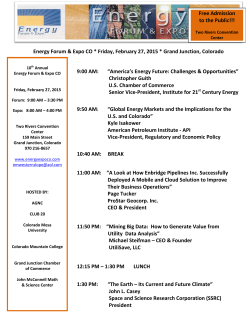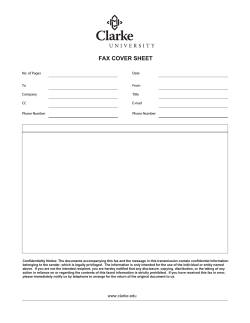
Supreme Court Rules on Colorado DMA Case
WWW.ALSTON.COM State & Local Tax Advisory n MARCH 4, 2015 Supreme Court Rules on Colorado DMA Case and Reverses Broad Interpretation of Tax Injunction Act On March 3, 2015, the United States Supreme Court unanimously held that the federal Tax Injunction Act (TIA), 26 U.S.C. § 1341, does not bar federal court jurisdiction over a suit to enjoin Colorado from enforcing its use tax information notice and reporting requirements against non-nexus retailers, even though an assessment or collection of a state tax may be based on such information.1 The Court’s decision in Direct Marketing Association v. Brohl thus reverses the Tenth Circuit’s erroneously broad interpretation of the TIA, which enjoins federal courts from enforcing a law that relates to the “assessment, levy or collection” of a state tax. Colorado Notification Requirements In an effort to increase voluntary payment by Colorado residents of the state’s use tax on purchases made online, in 2010 Colorado enacted H.B. 10-1193, which imposes certain information notice and reporting requirements on out-of-state retailers regarding sales made to Colorado residents.2 Specifically, the legislation creates three reporting obligations for out-of-state retailers that are not obligated to collect use tax from Colorado purchasers. First, at the time of purchase, the retailer must notify the purchaser that although the retailer does not collect Colorado sales tax, the purchaser is obligated to self-report Colorado use tax.3 Second, the retailer must provide an annual notice to Colorado residents who purchased over $500 worth of goods reminding them that they are obligated to report use tax on such purchases.4 Third, the retailer must provide an annual report to the Colorado Department of Revenue (the “department”) and provide details regarding customer names, addresses and amounts of purchases.5 1 Direct Marketing Association v. Brohl, No. 13-1032, 575 U.S. ____ (March 3, 2015). 2 See H.B. 10-1193 (2010). 3 Colo. Rev. Stat. § 39-21-112(3.5)(c)(I). 4 1 Colo. Code Regs. § 201-1:39-21-112.3.5(a), (c). 5 Colo. Rev. Stat. § 39-21-112(3.5)(d)(II)(A). This advisory is published by Alston & Bird LLP to provide a summary of significant developments to our clients and friends. It is intended to be informational and does not constitute legal advice regarding any specific situation. This material may also be considered attorney advertising under court rules of certain jurisdictions. WWW.ALSTON.COM 2 History of the Case In 2010, the Direct Marketing Association (DMA), a trade association of marketers, sued the department in federal district court in Colorado, contending that the notice and reporting requirements imposed by H.B. 10-1193 violated the Commerce Clause. The district court found that it did, granting the DMA’s motion for summary judgment and holding that the notice and reporting requirements discriminated against interstate commerce and constituted undue burdens. The district court issued a permanent injunction enjoining the department from enforcing the remote seller notice and reporting law. The department appealed. The Tenth Circuit Court of Appeals, without reaching the merits of the case, determined that the TIA precluded the district court from exercising jurisdiction and vacated the judgment.6 The Supreme Court granted certiorari on the procedural issue of whether the TIA bars federal court jurisdiction over the case. The Supreme Court’s Decision Justice Thomas delivered the opinion for a unanimous court. He framed the issue as “whether the enforcement of the notice and reporting requirements is an act of ‘assessment, levy or collection’” for purposes of the TIA.7 The Court looked to federal tax law as a guide to define these terms, noting that the TIA was modeled on an act that concerns federal taxation, the Anti-Injunction Act.8 The Court compared the TIA’s language to various Internal Revenue Code (IRC) provisions and determined that the terms “assessment, levy or collection” refer to “discrete phases of the taxation process that do not include information notices or private reports of information relevant to tax liability.”9 The Court further discussed the history of information gathering with respect to the IRC, noting that the information and reporting requirements are imposed “before assessment, levy, or collection.”10 The Court therefore found that Colorado’s enforcement of H.B. 10-1193’s notice and reporting requirements did not encompass assessment, levy or collection, notwithstanding the fact that notice and reporting may improve Colorado’s ability to assess or collect in the future. In addition, the Court addressed the Tenth Circuit’s interpretation of the word “restrain,” as the TIA also enjoins suits that “suspend or restrain” the assessment, levy or collection of a state tax. The Tenth Circuit reached its holding by applying an exceedingly broad definition of the term “restrain” such that any state law that might in any way hold back the state’s ability to enforce its chosen tax scheme should trigger the TIA. In our amicus brief on behalf of the Institute for Professionals in Taxation, we explored the absurd consequences the Tenth Circuit’s interpretation would have given rise to—that it would have allowed states to manipulate their laws to avoid federal court review of any law that, according to the state, was related to “tax enforcement.” It was clear that this was of particular interest to the Court, as during oral argument, numerous hypotheticals regarding actions that might “hold back” the ability of a state to enforce its laws were posed to counsel for both parties. Ultimately, the Supreme Court seemed to easily determine that the Tenth Circuit’s definition of “restrain” was overly broad and that such interpretation was not correct when read within the statutory context. In contrast to the Tenth Circuit, the Court interpreted the term narrowly to mean “[t]o prohibit from action; to put compulsion upon … to enjoin,” which 6 Direct Marketing Association v. Brohl, 735 F. 3d 904 (10th Cir. 2013). 7 Direct Marketing Association v. Brohl, No. 13-1032, slip op. at 5 (March 3, 2015). 8 2 6 U.S.C. § 7421(a). The Anti-Injunction Act provides that “no suit for the purpose of restraining the assessment or collection of any tax shall be maintained in any court by any person.” 9 Direct Marketing Association v. Brohl, No. 13-1032, slip op. at 5-6 (March 3, 2015). 10 Direct Marketing Association v. Brohl, No. 13-1032, slip op. at 6 (March 3, 2015) (emphasis added). WWW.ALSTON.COM 3 captures only those orders that stop acts of “assessment, levy and collection.”11 Accordingly, the Court concluded that “a suit cannot be understood to ‘restrain’ the ‘assessment, levy or collection’ of a state tax if it merely inhibits those activities.”12 The Court also noted that adoption of the narrower definition will result in a clear rule rather than a vague boundary that would invite further misapplication of the TIA. Justice Kennedy’s concurrence provides interesting dicta regarding the “injustice faced by Colorado and many other States” as a result of the Court’s Commerce Clause jurisprudence that does not account for “the dramatic technological and social changes that [have] taken place in our increasingly interconnected economy.”13 Although Justice Kennedy joined the opinion of the Court, he is sympathetic to the states that “have been unable to collect many of the taxes due on [e-commerce] purchases.”14 Justice Kennedy’s concurrence echoes the Court’s opinion that the loss of tax revenue is significant “especially as Internet retailers have increasingly displaced their brick-and-mortar kin.”15 Finally, Justice Kennedy further requested that the legal system find “an appropriate case for this Court to reexamine Quill and Bellas Hess”—a strange request, given that the legal system itself isn’t likely to do anything. Many commentators are using Justice Kennedy’s request to stir up fear that the Supreme Court will revisit—and reverse—Quill, but we think the better reading of the Court’s narrow opinion, which focused on the text of the TIA, is that the Supreme Court has little interest in revisiting an issue it said it was “putting to rest” in Quill. However, it is interesting to note that Justice Kennedy’s view on the importance of stare decisis may have softened somewhat on this issue. The concurrence in Quill, which Kennedy joined, stated: I also agree that the Commerce Clause holding of Bellas Hess should not be overruled. Unlike the Court, however, I would not revisit the merits of that holding, but would adhere to it on the basis of stare decisis. Congress has the final say over regulation of interstate commerce, and it can change the rule of Bellas Hess by simply saying so. We have long recognized that the doctrine of stare decisis has “special force” where “Congress remains free to alter what we have done.” Moreover, the demands of the doctrine are “at their acme . . . where reliance interests are involved.” As the Court notes, “the Bellas Hess rule has engendered substantial reliance and has become part of the basic framework of a sizeable industry.”16 The Court believed the proper venue to address Quill—if one believes that effort is appropriate at all—is through the legislative process. In this regard, given that Congress is currently considering this exact issue through the Marketplace Fairness Act effort, it seems even less likely that the Court will try to find “an appropriate case.” What is more likely, we believe, is that Kennedy’s concurrence will influence Congress to act. Considerations Although the Court determined that federal courts have jurisdiction in this case, it did not express a view on the merits—i.e., whether the notice and collection requirements imposed by H.B. 10-1193 in fact constitute violations of the Commerce Clause. The most important takeaway from the Supreme Court’s action this week, then, is its clear statement that the TIA does not bar access to federal court for challenges that do not affect the “assessment, levy or collection” of a state tax, even if they may have some impact on the state’s ability to enforce its taxation scheme. 11 Direct Marketing Association v. Brohl, No. 13-1032, slip op. at 10 (March 3, 2015). 12 Direct Marketing Association v. Brohl, No. 13-1032, slip op. at 12 (March 3, 2015). 13 Direct Marketing Association v. Brohl, No. 13-1032, (Kennedy, H., concurring) concurring op. at 1-2 (March 3, 2015). 14 Direct Marketing Association v. Brohl, No. 13-1032, (Kennedy, H., concurring) concurring op. at 2 (March 3, 2015). 15 Direct Marketing Association v. Brohl, No. 13-1032, slip op. at 2 (March 3, 2015). 16 Quill Corp. v. North Dakota, 504 U.S. 298, 319-320 (1992). 4 If you would like to receive future State & Local Tax Advisories electronically, please forward your contact information to SALT.advisory@alston.com. Be sure to put “subscribe” in the subject line. If you have any questions or would like additional information, please contact your Alston & Bird attorney or any of the following: Samantha M. Bautista 213.576.1052 samantha.bautista@alston.com Michael M. Giovannini 404.881.7957 michael.giovannini@alston.com Michael T. Petrik 404.881.7479 mike.petrik@alston.com Mary T. Benton 404.881.7255 mary.benton@alston.com Zachry T. Gladney 212.210.9423 zach.gladney@alston.com Edward Tanenbaum 212.210.9425 edward.tanenbaum@alston.com Clark R. Calhoun 213.576.1137 clark.calhoun@alston.com Matthew P. Hedstrom 212.210.9533 matt.hedstrom@alston.com Rachel Trickett 212.210.9432 rachel.trickett@alston.com Liz Cha 202.239.3721 liz.cha@alston.com Kendall L. Houghton 202.239.3673 kendall.houghton@alston.com Charles D. Wakefield 212.210.1281 charles.wakefield@alston.com John L. Coalson, Jr. 404.881.7482 john.coalson@alston.com Richard C. Kariss 212.210.9452 richard.kariss@alston.com Andrew W. Yates 404.881.7677 andy.yates@alston.com Jasper L. Cummings, Jr. 919.862.2302 jack.cummings@alston.com Ethan D. Millar 213.576.1025 ethan.millar@alston.com WWW.ALSTON.COM © ALSTON & BIRD LLP 2015 ATLANTA: One Atlantic Center n 1201 West Peachtree Street n Atlanta, Georgia, USA, 30309-3424 n 404.881.7000 n Fax: 404.881.7777 BRUSSELS: Level 20 Bastion Tower n Place du Champ de Mars n B-1050 Brussels, BE n +32 2 550 3700 n Fax: +32 2 550 3719 CHARLOTTE: Bank of America Plaza n 101 South Tryon Street n Suite 4000 n Charlotte, North Carolina, USA, 28280-4000 n 704.444.1000 n Fax: 704.444.1111 DALLAS: 2828 North Harwood Street n 18th Floor n Dallas, Texas, USA, 75201 n 214.922.3400 n Fax: 214.922.3899 LOS ANGELES: 333 South Hope Street n 16th Floor n Los Angeles, California, USA, 90071-3004 n 213.576.1000 n Fax: 213.576.1100 NEW YORK: 90 Park Avenue n 15th Floor n New York, New York, USA, 10016-1387 n 212.210.9400 n Fax: 212.210.9444 RESEARCH TRIANGLE: 4721 Emperor Blvd. n Suite 400 n Durham, North Carolina, USA, 27703-85802 n 919.862.2200 n Fax: 919.862.2260 SILICON VALLEY: 1950 University Avenue n 5th Floor n East Palo Alto, CA 94303-2282 n 650.838.2000 n Fax: 650.838.2001 WASHINGTON, DC: The Atlantic Building n 950 F Street, NW n Washington, DC, USA, 20004-1404 n 202.756.3300 n Fax: 202.756.3333
© Copyright 2025










